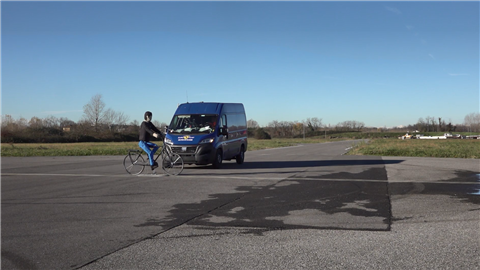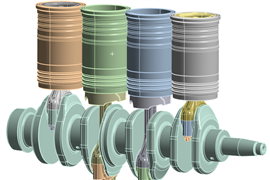Euro NCAP introduces tougher van tests
26 April 2023
 Fiat Ducato commercial van safety testing (Photo: Euro NCAP)
Fiat Ducato commercial van safety testing (Photo: Euro NCAP)
In 2021, Euro NCAP launched the Commercial Van Safety Rating to help improve safety information for fleet managers and promote a safer driving experience for van drivers and other road users.
For 2023, those initial test standards have been made more stringent, looking at the availability (standard or optional) of onboard safety equipment to help reduce the likelihood of road traffic accidents.
According to Euro NCAP, commercial vans do not have a higher crash rate than other vehicles, but collisions ‘tend to be more severe for their opponent vehicles and vulnerable road users’. The group reports that ADAS (Advanced Driver Assistance Systems) technology can help prevent or mitigate the consequences of these crashes.
Euro NCAP further states that the new criteria for Commercial Van Ratings takes ADAS to a higher level, with greater emphasis on vulnerable road users, including pedestrian and cyclist safety, together with night-time scenarios.
“Safety technologies and innovative solutions are developing at a fast pace. Euro NCAP must develop its criteria to ensure that manufacturers maintain the impetus to innovate and make available the latest safety technologies in all vehicles on European roads,” said Michiel van Ratigen, secretary general, Euro NCAP.
“Just because vans are used for commercial purposes, does not mean they should be any less safe than passenger cars. Under Euro NCAP’s plans by 2026, vans will be expected to meet the same ADAS requirements as passenger cars,” he added.
Tested safety systems (either standard or optional) now include Automatic Emergency Braking (AEB), Lane Support, Speed Assist and Attention Assist (driver fatigue).
Eighteen vans were tested under the new criteria. Of those, none achieved the Platinum rating. Two vehicles achieved the Gold rating: Fiat Ducato (previously a Platinum-rated vehicle) and Ford Transit.
Data for the Ford Transit was noted as extending to the E-Transit, which features a battery-electric (BE) powertrain – the E-Ducato was released after testing. DPI asked Euro NCAP about the criteria for battery disconnect systems in vans fitted with BE drivetrains. These disconnect the battery pack in the event of a collision.
“Euro NCAP already has requirements for BEV in our car programme, where we check the battery disconnect during our full vehicle crash tests. Vans will have the same requirements, also from a legal GSR2 perspective,” said Richard Schram, technical director.
GSR2, or Global Safety Regulations 2, came into effect in 2022 (a second round of standards will come into effect in 2024). These outline the safety technologies which must be offered as standard on passenger cars sold in Europe.
Under Euro NCAP plans, by 2026 vans will have the same ADAS requirements as passenger cars.
In addition, Euro NCAP stated that it has plans to expand its safety testing to larger and heavier trucks, including HGVs. Under its Vision Zero initiative, the group is planning to release a new ratings scheme later in 2023 that will outline those areas which will be tested, supporting the development directions of HGV OEMs.
It is noted that while HGVs represent about 1.5% of all traffic in Europe, they are involved in 15% of road fatalities.
Asked about testing of battery-electric HGVs, Schram said: “Euro NCAP has just started to look into HGVs and we will most certainly test the BE variants of HGVs where available.”
POWER SOURCING GUIDE
The trusted reference and buyer’s guide for 83 years
The original “desktop search engine,” guiding nearly 10,000 users in more than 90 countries it is the primary reference for specifications and details on all the components that go into engine systems.
Visit Now
STAY CONNECTED




Receive the information you need when you need it through our world-leading magazines, newsletters and daily briefings.
CONNECT WITH THE TEAM













